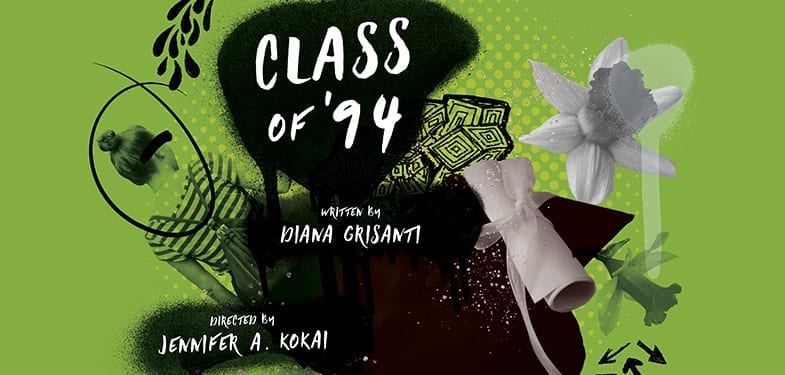
OGDEN — Director Jennifer Kokai, with the help of the Hurst Foundation, commissioned playwright Diana Grisanti to write a play that would premiere at Weber State University. This play, titled Class of ’94, premiered on April 6th, 2018. The result was a compelling and timely story of sexual assault, the challenges faced by a community rocked by scandal, and the challenges brought on by choices.
The first thing that I noticed as I walked into the theatre was the aesthetics of the set, which were breathtaking. There were white roses hanging from the ceiling and stained glass windows, reflective of the catholic school setting. However, in one of the windows was a girl holding a sign that said “#metoo”, giving a clue to the content of the show. Set designer Sam Transleau excelled at making a visual representation of the important subject matter.
Outside the theatre and on the program were warnings that not only was the content mature, for ages 18 and above, but that also the content may be triggering. I was quite impressed with Weber State as an institution when director Kokai stood up before the show and stated that due to some of the content in the show, advocates from the Women’s Center on campus were sitting outside of the theatre, and anyone who felt the need to leave should feel free to do so and speak to any of the advocates. While experiencing this production, I could see how some of the content could be triggering to some audience members and felt glad that this support system was put in place.
Within the show, several of the characters and themes undertook the heavy subject matter, from the experience of sexual assault, to the gossip of a small town experience; to those who want to help but have their own beliefs regarding what is the right way to handle a situation; to the experience of being a perpetrator; and the difficulty of believing that someone you know can be capable of committing such a crime.
There is so much that could be said about this production and the choices that were taken. As a world premiere, it is a work in progress. At a special talk-back after the show, author Grisanti was open and willing to discuss some of the choices she made and consider ways to revise them. One of the strongest points of the show was the character of Matt Mitchell (portrayed by Riley French), the perpetrator of the sexual assault. It seems an almost impossible task to create a sense of empathy regarding someone in that role while still emphasizing the seriousness of the assault, yet both Grisanti and French were able to make that balance possible. Director Kokai stated that one thing that was important to her was to cast a kind person in the role, as a reminder that rapists and abusers are not a “type,” but are often those around us with good qualities and people we care about. Along that same line, one scene near the end with two other students, Taylor (played by Morgan Hekking) and Chase (played by Nikolas Justice), was an important interaction, where both reflect whether they have made choices that led someone to feel forced to do something against their will.
Actress Estephani Cerros excelled at playing the survivor, Fabiana, who struggles with the after-effects of such an experience. During a strong scene of the show, Cerros portrays a very realistic panic attack in front of her guidance counselor, Ms. Donahue, played by Cydney Hall. An effective addition to that scene was the sound element of a heartbeat that made the panic feel more intense and present. Hall’s performance of a kind and caring counselor that also struggles with handling rules and regulations was impressive and realistic. Sound designer Hayden Wadsworth added several different sound elements that added to the story and helped bring the audience into the experience.
The close friends of Fabiana’s closest friends, Taylor (Hekking), Grace (Monroe Howell), and Marina in particular (Liberty Lockett), were integral to not only the plot, but the accurate characterization of the different types of friendships and reactions to something as scary as sexual assault.
There is a subplot within the show about graduates from the class of ’94 that try to step in and help with the situation, and actually seem to make it worse, rather than better. This is a common and important element to consider in any situation of sexual assault. However, it was also the weakest aspect of the show. The actresses in this group were well cast and performed excellently, but the story seemed slightly disjointed from the rest of the production, and may need to be tightened up as part of the process of performing a show in front of an audience.
This is an important production that I am glad Weber State has chosen to taken on. The content is mature in its themes and difficult to take at some points. However, the true offensiveness comes in the fact that these kinds of incidents continue to happen, and we are often afraid to have an open dialogue concerning them.
[box] Class of ‘94 plays at the Eccles Theater in the Browning Center on the campus of Weber State University April 10-14, 2018, at 7:30pm with a 2pm matinee on the 14th. Tickets are $11-13. For more information about productions at Weber State University, visit www.weberstate.edu/browningcenter. [/box]
